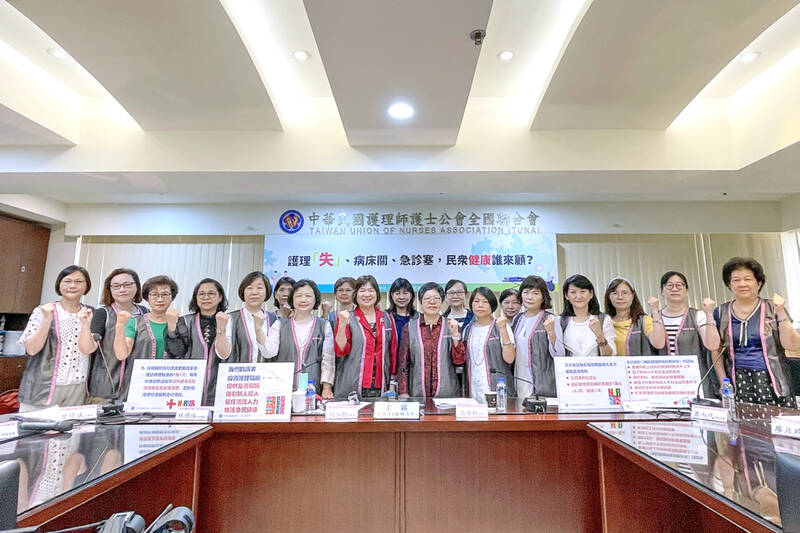Nearly 57 percent of nurses said they do not think a Cabinet plan to provide bonuses to night and overnight (graveyard) shift nurses would help to address the nation’s nursing shortage, according to a survey published on Thursday by the Taiwan Union of Nurses Association (TUNA).
The COVID-19 pandemic has worsened the national nursing shortage, as reflected in official figures.
Ministry of Health and Welfare (MOHW) data show that there are about 310,000 registered professional nurses in Taiwan, but as of Oct. 11, only 188,879 were working, accounting for about 60 percent, with about 118,000 nurses working in hospitals.

Photo: Chiu Chih-jou, Taipei Times
Last year, the turnover rate of nursing staff reached 11.79 percent, while the vacancy rate stood at 6.53 percent, both a 10-year high, TUNA president Chi Shu-ching (紀淑靜) said at a news conference on Thursday, citing the ministry’s data.
In a bid to boost nursing staff numbers, the Cabinet on Sept. 28 approved a 12-point incentive program, which includes paying a bonus to night-shift nurses, with the aim of improving working conditions.
However, the plan has drawn criticism from many nurses, with some expressing worries that offering an additional bonus only to night-shift nurses could cause an inequitable distribution of nursing personnel and lead to fewer day-shift nurses, the union said.
The survey found that 34 percent of respondents said they completely disagree that the policy would help boost the workforce, 22.9 percent disagree and 22.8 percent were unsure of what effect it would have, TUNA executive director Hsiao Shu-tai (蕭淑代) said.
Many respondents felt the night-shift incentive policy would “be considered unfair by day-shift nurses,” she said. “It makes shift booking, shift swapping and scheduling even more difficult” and could cause additional sources of conflict among coworkers and create management problems, she said.
A shortage of nurses has led hospitals in Taiwan to close wards and reduce bed numbers. As a result, emergency room visits continue to increase, creating a heavy burden on emergency room paramedics, Chi said.
Reducing overcrowding in emergency rooms is critical to addressing the nursing shortage and better patient outcomes, she added.
The top-priority measures the ministry should implement now are to first raise funds to cover a salary increase of NT$10,000 per nurse per month for two consecutive years, and to amend regulations on nurse-patient ratios in three shifts, Chi said.
The poll was conducted from Oct. 6 to Oct. 9 by sending a questionnaire to 118,000 hospital nurses asking them questions about the night-shift bonus policy, with 25,519 valid samples collected.
MOHW Department of Nursing and Healthcare Director-General Tsai Shu-feng (蔡淑鳳) said the policy of offering bonuses to night and graveyard-shift nurses is only a supplementary measure in the 12-point incentive program, and the government’s policy direction is coherent with the association’s suggestions.

The Grand Hotel Taipei on Saturday confirmed that its information system had been illegally accessed and expressed its deepest apologies for the concern it has caused its customers, adding that the issue is being investigated by the Ministry of Justice Investigation Bureau. The hotel said that on Tuesday last week, it had discovered an external illegal intrusion into its information system. An initial digital forensic investigation confirmed that parts of the system had been accessed, it said, adding that the possibility that some customer data were stolen and leaked could not be ruled out. The actual scope and content of the affected data

‘LIKE-MINDED PARTNER’: Tako van Popta said it would be inappropriate to delay signing the deal with Taiwan because of China, adding he would promote the issue Canadian senators have stressed Taiwan’s importance for international trade and expressed enthusiasm for ensuring the Taiwan-Canada trade cooperation framework agreement is implemented this year. Representative to Canada Harry Tseng (曾厚仁) in an interview with the Central News Agency (CNA) said he was increasingly uneasy about Ottawa’s delays in signing the agreement, especially as Ottawa has warmed toward Beijing. There are “no negotiations left. Not only [is it] initialed, we have three versions of the text ready: English, French and Mandarin,” Tseng said. “That tells you how close we are to the final signature.” Tseng said that he hoped Canadian Prime Minister Mark Carney

President William Lai (賴清德) yesterday bestowed one of Taiwan’s highest honors on Saint Vincent and the Grenadines (SVG) Ambassador Andrea Clare Bowman in recognition of her contributions to bilateral ties. “By conferring the Order of Brilliant Star with Grand Cordon on Ambassador Bowman today, I want to sincerely thank her, on behalf of the Taiwanese people, for her outstanding contribution to deepening diplomatic ties between Taiwan and SVG,” Lai said at a ceremony held at the Presidential Office in Taipei. He noted that Bowman became SVG’s first ambassador to Taiwan in 2019 and

A man walks past elementary school artworks at the Taipei Lantern Festival in Ximen District yesterday, the first day of the event. The festival is to run from 5pm to 10pm through March 15.